
MEMANTINE ARISTO 10 mg/ml ORAL SOLUTION
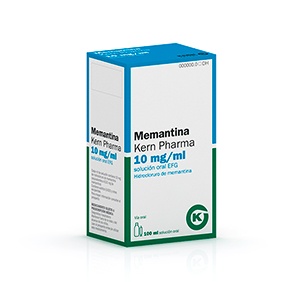

How to use MEMANTINE ARISTO 10 mg/ml ORAL SOLUTION
Translated with AI
This page provides general information and does not replace a doctor’s consultation. Always consult a doctor before taking any medication. Seek urgent medical care if symptoms are severe.
Show originalContents of the leaflet
Introduction
Package Leaflet: Information for the User
Memantina Aristo 10 mg/ml Oral Solution EFG
Memantine, hydrochloride
Read all of this leaflet carefully before you start taking this medicine because it contains important information for you.
- Keep this leaflet, you may need to read it again.
- If you have any further questions, ask your doctor or pharmacist.
- This medicine has been prescribed for you only. Do not pass it on to others. It may harm them, even if their signs of illness are the same as yours.
- If you get any side effects, talk to your doctor or pharmacist. This includes any possible side effects not listed in this leaflet. See section 4.
Contents of the pack
- What Memantina Aristo is and what it is used for.
- What you need to know before you take Memantina Aristo.
- How to take Memantina Aristo.
- Possible side effects.
- Storage of Memantina Aristo.
- Contents of the pack and other information.
1. What Memantina Aristo is and what it is used for
How Memantina Aristo works
Memantina Aristo contains the active substance memantine hydrochloride. This belongs to a group of medicines called anti-dementia medicines.
Memory loss in Alzheimer's disease is due to a disturbance in brain signals. The brain contains so-called N-methyl-D-aspartate (NMDA) receptors that are involved in the transmission of important nerve signals in learning and memory. Memantine belongs to a group of medicines called NMDA receptor antagonists. Memantine acts on these receptors, improving the transmission of nerve signals and memory.
What Memantina Aristo is used for
Memantina Aristo is used in the treatment of patients with moderate to severe Alzheimer's disease.
2. What you need to know before you take Memantina Aristo
Do not take Memantina Aristo
- if you are allergic to memantine hydrochloride or any of the other ingredients of this medicine (listed in section 6).
Warnings and precautions
Consult your doctor or pharmacist before starting to take Memantina Aristo,
- if you have a history of epileptic seizures (convulsions).
- if you have recently suffered a myocardial infarction (heart attack), if you suffer from congestive heart failure or if you have uncontrolled hypertension (high blood pressure).
In these situations, treatment should be carefully supervised and your doctor should regularly re-evaluate the clinical benefit of Memantina Aristo.
If you have renal insufficiency (kidney problems), your doctor should closely monitor your kidney function and, if necessary, adjust the dose of memantine.
The use of memantine should be avoided with other medicines such as amantadine (for the treatment of Parkinson's disease), ketamine (a drug commonly used to produce anesthesia), dextromethorphan (a drug for the treatment of cough) and other NMDA antagonists.
Children and adolescents.
Memantina Aristo is not recommended for use in children and adolescents under 18 years of age.
Use of Memantina Aristo with other medicines
Tell your doctor or pharmacist if you are taking, have recently taken or might take any other medicines.
In particular, the administration of Memantina may produce changes in the effects of the following medicines, so your doctor may need to adjust the doses:
- amantadine, ketamine, dextromethorphan.
- dantrolene, baclofen.
- cimetidine, ranitidine, procainamide, quinidine, quinine, nicotine.
- hydrochlorothiazide (or any combination with hydrochlorothiazide).
- anticholinergics (substances commonly used to treat movement disorders or intestinal spasms).
- anticonvulsants (substances used to prevent and eliminate convulsions).
- barbiturates (substances commonly used to induce sleep).
- dopaminergic agonists (substances such as L-dopa, bromocriptine).
- neuroleptics (substances used in the treatment of mental illnesses).
- oral anticoagulants.
If you are hospitalized, inform your doctor that you are taking Memantina Aristo.
Memantina Aristo with food and drink
You should inform your doctor if you have recently changed or intend to change your diet substantially (e.g., from a normal diet to a strict vegetarian diet) or if you have renal tubular acidosis (RTA, excess of acid-producing substances in the blood due to kidney dysfunction) or severe urinary tract infections (urinary tract), as your doctor may need to adjust the dose of the medicine.
Pregnancy and breastfeeding
If you are pregnant or breastfeeding, think you may be pregnant or are planning to have a baby, ask your doctor or pharmacist for advice before taking this medicine.
Pregnancy
The use of memantine is not recommended in pregnant women.
Breastfeeding
Women taking Memantina Aristo should stop breastfeeding.
Driving and using machines
Your doctor will inform you if your illness allows you to drive and use machines safely.
Also, Memantina Aristo may alter your reaction ability, so driving or operating machinery may be inappropriate.
Memantina Aristo contains sorbitol (E 420)
If your doctor has told you that you have an intolerance to some sugars, consult with them before taking this medicine.
3. How to take Memantina Aristo
Follow exactly the administration instructions of this medicine indicated by your doctor. In case of doubt, consult your doctor or pharmacist again.
Posology
0.5 ml of oral solution contains 5 mg of memantine hydrochloride.
The recommended dose of Memantina Aristo in adult patients and elderly patients is 2 ml, equivalent to 20 mg, once a day.
To reduce the risk of side effects, this dose is gradually achieved following the following daily treatment scheme:
Treatment period | Daily dose (ml) |
Week 1 | 0.5 ml once a day (1 x 5 mg) |
Week 2 | 1 ml once a day (1 x 10 mg) |
Week 3 | 1.5 ml once a day (1 x 15 mg) |
Week 4 | 2 ml once a day (1 x 20 mg) |
The usual starting dose is 0.5 ml (equivalent to 5 mg) taken once a day, the first week. This dose is increased to 1 ml (equivalent to 10 mg), taken once a day, during the second week and to 1.5 ml (equivalent to 15 mg), taken once a day, during the third week. From the fourth week, the recommended dose is 2 ml (equivalent to 20 mg), taken once a day.
Posology for patients with reduced renal function
If you have kidney problems, your doctor will decide the appropriate dose for your condition. In this case, your doctor should periodically monitor your kidney function.
Administration
Memantina Aristo should be administered orally once a day. To get the most out of your medication, you should take it every day and at the same time. The solution can be taken with or without food.
The solution should not be poured or dispensed directly into the mouth from the bottle or syringe. Measure the dose using the syringe and pour it into a spoon or into a glass of water.
Instructions for use
- Open the bottle: Press the cap and unscrew it counterclockwise.
- Insert the adapter of the dosing syringe into the neck of the bottle (Figure 1). Make sure the adapter is firmly adjusted.
- Insert the syringe into the adapter (Figure 1).
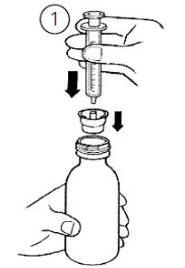 Turn the bottle over, placing the mouth of the bottle downwards (Figure 2).
Turn the bottle over, placing the mouth of the bottle downwards (Figure 2).
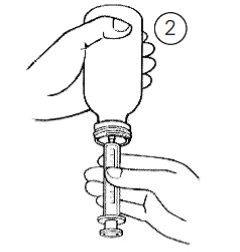
- Fill the dosing syringe with a small amount of solution by gently pulling the plunger (Figure 3A). Then push the plunger up, emptying the contents to remove any air bubbles that may be present (Figure 3B). Then slide the plunger to the mark in milliliters (ml) corresponding to the dose prescribed by your doctor (Figure 3C).
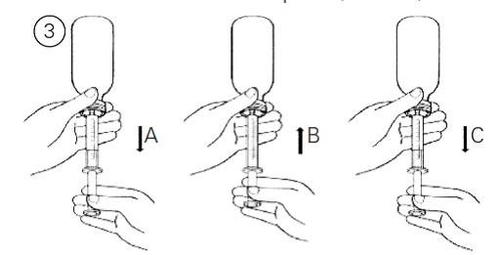
- Place the bottle upright, supported on its base. Remove the syringe from the adapter.
- Empty the contents of the syringe into a spoon or into a glass of water, pushing the plunger and emptying the contents of the syringe (Figure 4).
- Take the complete contents of the spoon or the glass of water
- Rinse the syringe with water only (Figure 5).
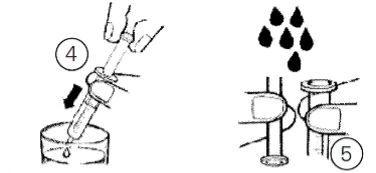
- Close the bottle with the screw cap.
Duration of treatment
Continue taking Memantina Aristo while it benefits you. Your doctor should evaluate your treatment periodically.
If you take more Memantina Aristo than you should
In case of overdose or accidental ingestion, consult your doctor or pharmacist immediately or call the Toxicology Information Service, phone: (91) 5620420, indicating the medicine and the amount ingested.
In general, taking an excessive amount of Memantina Aristo should not cause you any harm. You may experience an increase in the symptoms described in section 4 "Possible side effects".
If you forget to take Memantina Aristo
- If you realize that you have forgotten to take your dose of Memantina Aristo, wait and take the next dose at the usual time.
Do not take a double dose to make up for forgotten doses.
4. Possible side effects
Like all medicines, this medicine can cause side effects, although not everybody gets them.
In general, side effects are classified from mild to moderate.
Frequent (may affect up to 1 in 10 patients):
- Headache, drowsiness, constipation, elevated liver function, dizziness, balance disorder, shortness of breath, high blood pressure, and hypersensitivity to the medicine.
Infrequent (may affect up to 1 in 100 patients):
- Fatigue, fungal infections, confusion, hallucinations, vomiting, gait disturbance, heart failure, and formation of blood clots in the venous system (thrombosis/venous thromboembolism)
Very rare (may affect up to 1 in 10,000 patients):
- Seizures.
Frequency not known (frequency cannot be estimated from the available data):
- Pancreatitis, hepatitis (inflammation of the liver), and psychotic reactions.
Alzheimer's disease has been associated with depression, suicidal ideation, and suicide. These events have been reported in patients treated with Memantina.
Reporting of side effects
If you experience any side effects, talk to your doctor or pharmacist, even if it is possible side effects not listed in this leaflet. You can also report them directly through the national reporting system:
Spanish Medicines Monitoring System Website: www.notificaRAM.es
By reporting side effects, you can help provide more information on the safety of this medicine.
5. Storage of Memantina Aristo
Keep this medicine out of the sight and reach of children.
Do not use this medicine after the expiry date which is stated on the carton and on the label of the bottle after EXP. The expiry date is the last day of the month stated.
No special storage conditions are required.
Once opened, the contents of the bottle should be used within 6 months.
Medicines should not be disposed of via wastewater or household waste. Place the bottle and any unused medicine in the SIGREcollection point at your pharmacy. If you have any further questions, ask your pharmacist how to dispose of the bottle and any unused medicine. This will help protect the environment.
6. Contents of the pack and other information
Composition of Memantina Aristo
? The active substance is memantine hydrochloride
? 1 ml of solution contains 10 mg of memantine hydrochloride, equivalent to 8.31 mg of memantine
- 0.5 ml of solution contains 5 mg of memantine hydrochloride, equivalent to 4.15 mg of memantine.
- The other ingredients are: potassium sorbate, liquid sorbitol 70% (non-crystallizing) (E420), purified water
Appearance of the product and contents of the pack
Memantina Aristo oral solution is a clear, colorless to yellowish solution.
Brown glass bottle with a graduated syringe (graduation marks of 0.5 ml) and a syringe adapter. It is available in bottles of 30 ml, 50 ml, or 100 ml of solution.
Clinical packaging: 500 ml.
Not all pack sizes may be marketed.
Marketing authorization holder
Aristo Pharma Iberia S.L.
C/ Solana 26
28850 – Torrejón de Ardoz, Madrid
Manufacturer
Laboratorios Medicamentos Internacionales, S.A. (Medinsa)C/ Solana 26
28850 – Torrejón de Ardoz, Madrid
ARISTO PHARMA GMBH
Wallenroder Strasse 8-10
13435 Berlin, Germany
NEURAXPHARM ARZNEIMITTEL GMBH U CO.KG
Elisabethselbert Strasse, 23
Langenfeld – 40764, Germany
This medicine is authorized in the Member States of the European Economic Area under the following names:
Germany: Memantin Aristo 10 mg/ml Lösung zum Einnehmen
Poland: Memantin NeuroPharma 10 mg/ml Roztwór doustny
Portugal: Memantina Aristo 10 mg/ml solução oral
Spain: Memantina Aristo 10 mg/ml solución oral EFG
Date of last revision of this leaflet: September 2017
Detailed information on this medicine is available on the website of the Spanish Agency for Medicines and Health Products: http://www.aemps.gob.es/
- Country of registration
- Active substance
- Prescription requiredYes
- Manufacturer
- This information is for reference only and does not constitute medical advice. Always consult a doctor before taking any medication. Oladoctor is not responsible for medical decisions based on this content.
- Alternatives to MEMANTINE ARISTO 10 mg/ml ORAL SOLUTIONDosage form: TABLET, 10 mgActive substance: memantineManufacturer: Merz Pharmaceuticals GmbhPrescription requiredDosage form: TABLET, 10 mgActive substance: memantineManufacturer: Merz Pharmaceuticals GmbhPrescription requiredDosage form: TABLET, 20 mgActive substance: memantineManufacturer: Merz Pharmaceuticals GmbhPrescription required
Online doctors for MEMANTINE ARISTO 10 mg/ml ORAL SOLUTION
Discuss questions about MEMANTINE ARISTO 10 mg/ml ORAL SOLUTION, including use, safety considerations and prescription review, subject to medical assessment and local regulations.
Frequently Asked Questions














